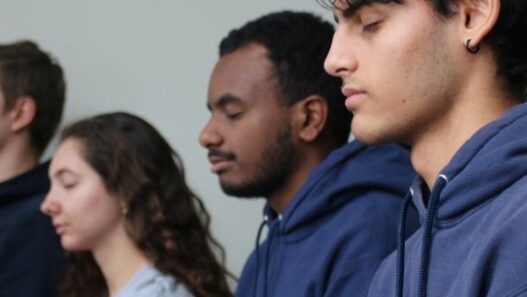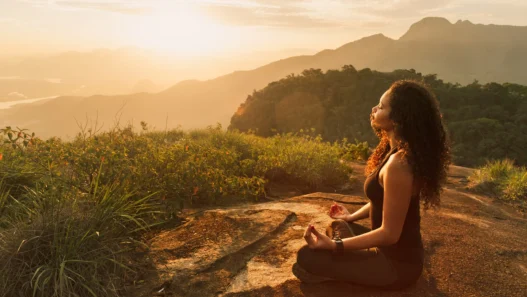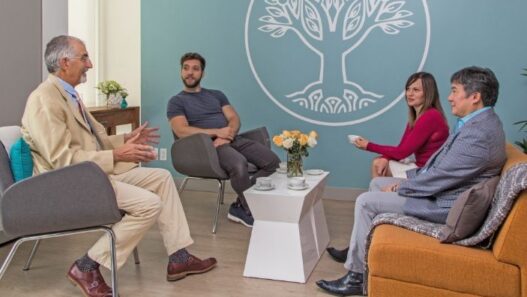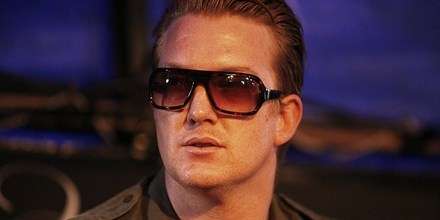 We continue our series of interviews with Donald Sosin, a composer and performer of music for silent films.
We continue our series of interviews with Donald Sosin, a composer and performer of music for silent films.
No one who has seen him play can deny the immensity of his talent. Like a living encyclopedia of music, Donald has the capacity to conjure up just the right sounds for the images running on screen – images which he often sees for the first time only when sitting down behind a piano on the stage. Eisenstein or Chaplin, China or Germany, a villain entering a hotel room or a girl falling in love amidst the Swiss Alps – Donald can do it all.
We talked with Donald Sosin about his work and its relationship with 40 years of Transcendental Meditation practice.
Donald, you have picked a profession which must be one of the rarest among all possible professions. How did you end up becoming a composer and performer for silent films?
DONALD SOSIN: Indeed, it’s a niche of the niche of the niche! I think there are only 40 to 50 people in the entire world today who earn their living this way.

For me, there was no grand plan. In fact, it was totally accidental.
I was playing for dance classes at the University of Michigan in Ann Arbor – and had some gigs in cocktail lounges, etc. Then in 1971, during my second year at college, I was playing some dinner music for my friends at our dorm – just because we happened to have a piano in the dining hall. Somebody brought in a projector, and a Laurel and Hardy movie. And I kept playing…
Then, in one of my composition lessons, my teacher said that someone was looking for accompanist for Phantom of the Opera – and he said to me, “I hear you’ve done this kind of thing already, so why don’t you play for this movie too?’ He was a great organist himself, so he would have done a great job at it. So in this random way my career began: I played two 90-minute shows back to back, with only a 10-minute pause in between. It was very strenuous! I practically fell down taking my final bow.

After that, I played for the other film society on campus whenever they showed a silent film. We hauled in this very heavy piano in from across the street – that would’ve made a good scene for a silent movie, actually! – and that’s how it all started.
A row of coincidences, but also a series of decisions. There must have been something which drew you into it.
DONALD SOSIN: I had a childhood filled with music – my parents took us to a lot of concerts and played records in the house all the time – so that must have laid the foundation. My father was also interested in theater, to the extent of doing his dissertation on Soviet children’s theater. And curiously, my father’s mother was in a silent film, back in 1911 or 1912! So there was some predisposition in my family, in my genes perhaps.
On the other hand, I’ve found that doing meditation increases your intuition: you feel that you have to go somewhere on a given day, or call someone, or make this or that decision. I got involved in the theater in New York, and by the time I graduated from college, I was playing music for silent films at the Museum of Modern Art. By now, I’ve played at most of the major silent movie festivals in the world, from San Francisco to Bologna.
When did you start meditating?
DONALD SOSIN: I began meditating in 1972.
By the time I got to college, I noticed that I was becoming less free and creative than when I had been, say, at 9 or 10. I was very stressed out, unable to accomplish what I wanted to do. I was in the composition program at Michigan, yet I was having a really hard time composing…
Fortunately, I was dating a girl whose brother was doing Transcendental Meditation. I decided to learn the technique – just give it a try and see what happens.
Within a short period of time, after I had started meditating, all the clouds blew away! I was able to compose, and more importantly, be happy about what I was composing. My whole life began to get better again.
How deeply ingrained is meditation in your daily life?
DONALD SOSIN: I have learnt the advanced techniques, so my program of meditation is more than an hour each morning and evening. With my work schedule it’s often quite difficult to find the perfect slot for it, but I try never to miss my meditation.

Maharishi once said that doing Transcendental Meditation actually gives you a set of values. In other words, you see life for what it really is, and you get a sense of purpose. Not that it comes in a blinding flash – it unfolds gradually. You begin to see your direction in life. Meditation helps you to operate at a much deeper level than what the words describe.
This must help also in your work, in a very technical sense – expressing the direction and ’flavor’ of the films without words. And doing that in a split second.
DONALD SOSIN: I try to bring the silence out in the music. And over the years, people have said things like ’I never realized what a great film it was until I heard it with you music,’ or ’I forgot that there was music at all, because I was just so completely caught up in the experience’.
More often than not, there’s no intellectual calculation of what’s happening. I just let the sound go out through my fingers. I’m just watching the movie, and the fingers respond.
Last night, for example, I did a John Ford film here in Lakeville – a movie I know very well, as I did the score for its DVD release. So on the one hand, I had definite themes for the main characters. On the other hand, I responded to that particular audience last night. It’s like being a race car driver who instinctively modifies his trajectory according to the terrain he is covering.
You’ve said in an earlier interview that silent movies, when shown with live, well-performed music, can give the audience even a greater experience than the modern movies with sound.
DONALD SOSIN: At Princeton University, there’s a scientist studying the brain waves of people while they’re watching different types of movies. What happens when there’s music and image and no talking is that suddenly a different area of our brain is being activated.
I think, moreover, that having live music creates something special between the musician and the audience. I can listen, not even on a conscious level, to the reaction of the people sitting in the auditorium, registering the small noises, coughing, rustling of paper etc. When it gets very silent in the audience, then there’s this nice space, this frictionless flow. It takes maybe half an hour to get there – sometimes more, sometimes less, depending on the movie, on the audience, on whether I’ve had had the time to meditate beforehand, etc.
If we delved into the metaphysics of it for a moment: Who is it that creates in that frictionless space? Or what is it?
DONALD SOSIN: (Laughs) When I listen to the tapes afterwards – I record most of the live performances – then I think to myself, ’Where did this come from!?’ It was not a conscious decision! Some of it is, of course, but some of it is just being so quiet inside that… the film is making the decisions. Or the big Self. Only that the big Self does not make any decisions! It’s just there, acting as that huge wave of support.
Watch an excerpt of a seminar where Donald describes his process of live performing. Credit: Emory University, 2013.
How does this influence your preparation for a performance?
DONALD SOSIN: Having played for thousands and thousands of hours of films, I have built up a huge repertoire of musical styles and themes – from dances to hymns, from symphonies to folk songs. Yet I just don’t think about it a lot.
For example, I got a film today which I’ve never seen before. I’m going to score it for DVD. I’ll watch it, take notes, perhaps write down some themes. Then I’ll play my keyboard straight into my computer and see what comes out of it. With most of the films I’ve done a score for, I haven’t written out any music ahead of time. Last year, I did four films for the German Film Archive, Deutsche Kinemathek, each of them a 2-hour movie – I wrote out only a few lines, and then did the recording.

It is, of course, more complicated when there are other instruments involved besides the piano. Writing for a quartet or for an ensemble demands precision, it’s more like solving a crossword puzzle. But the principle remains the same – it all flows from the storehouse of my memory, without the need to think about it long and hard.
Effortless effort, exactly like meditation.
DONALD SOSIN: For better or worse, I’m not one of those conscientious writers who rise up every morning to do their 5,000 words or 3 pages of music – and then a year later they have everything in the bag. There are times when I record very little, and then again there are very intense times: I recorded and produced almost 12 hours of music on DVD last year, in 3 different countries. Most of it comes very easily, without effort. It just takes a lot of time to edit — I have very high standards about accuracy so I spend hours correcting mistakes.
Donald Sosin has performed for silent films at festivals and concerts in the US, China, Japan, Germany, Italy, Russia etc. He has composed scores for over a thousand silent films and scored over 40 film DVDs. Here are two examples of his work.
http://www.youtube.com/watch?v=jIlGTuR0VfM
For a much wider selection of the music he has written and played over the years, please visit Donald’s home page!



















